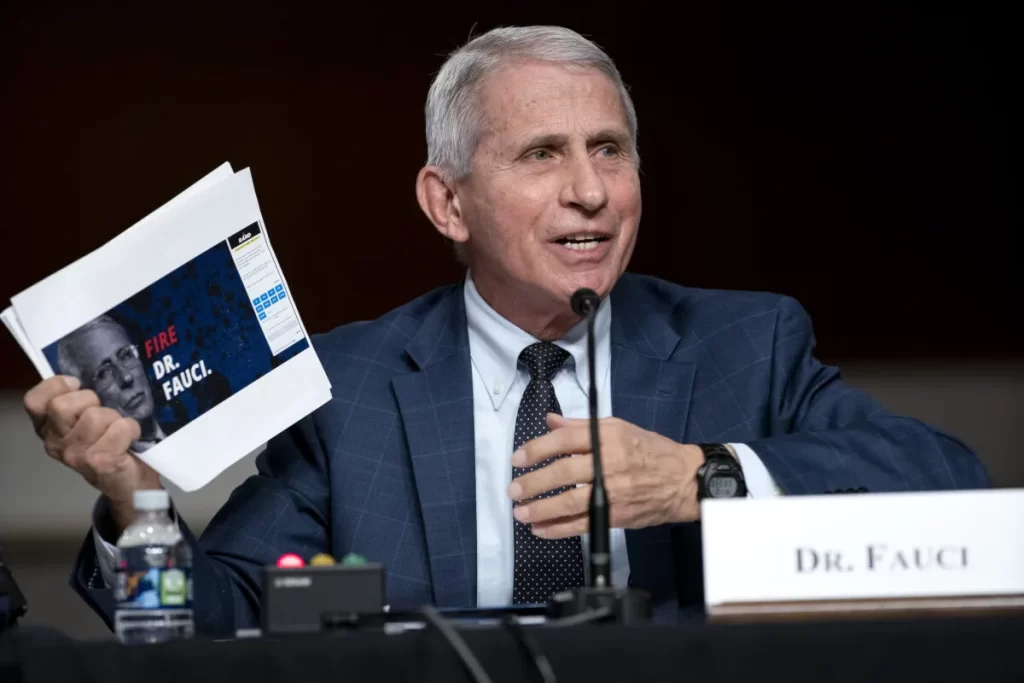A Republican-led House committee says it uncovered new email evidence suggesting that Dr. Anthony Fauci “prompted” the drafting of a “proximal origin” publication meant to “disprove” the COVID-19 lab leak theory.
The Select Subcommittee on the Coronavirus Pandemic issued a memo (pdf) on March 5 saying that there’s new evidence on the “proximal origin of SARS-COV-2,” the virus that causes COVID-19. The memo detailed a conference call between former National Institutes of Health (NIH) Director Dr. Francis Collins, former National Institute of Allergy and Infectious Diseases Director Dr. Anthony Fauci, and at least 11 other scientists in early February 2020, about a week after the first COVID-19 case was confirmed in the United States.
Collins, Fauci, and others were warned in the Feb. 1, 2020, call about the possibility that the virus may have leaked from a laboratory in Wuhan, China, in late 2019, according to the memo.
But two months later, Collins emailed Fauci and expressed “dismay that Proximal Origin—which they saw prior to publication and were given the opportunity to edit—did not squash the lab leak hypothesis and [asked] if the NIH can do more to ‘put down’ the lab leak hypothesis,” the memo states.
Citing internal emails, the committee asserted that Fauci “prompted” Dr. Kristian Andersen of Scripps Research to write the Proximal Origin paper and that it was designed “to ‘disprove’ any lab leak theory.” In August 2021, Scripps issued a letter to Republican House investigators and said that “Dr. Anthony Fauci did not attempt to influence his work. Both statements do not appear to be supported by the available evidence.”
“The presence in pangolins of [a virus’ receptor-binding domain] very similar to that of SARS-CoV-2 means that we can infer this was also probably in the virus that jumped to humans,” the paper reads.
“Privately, Dr. Andersen did not believe the pangolin data disproved a lab leak theory despite saying so publicly. It is still unclear what intervening event changed the minds of the authors of Proximal Origin in such a short period of time,” the House committee stated. “Based on this new evidence, the pangolin data was not the compelling factor; to this day, the only known intervening event was the February 1 conference call with Dr. Fauci.”
More Pressure
During congressional hearings, Fauci clashed with Republicans—particularly Sen. Rand Paul (R-Ky.). In one instance in 2021, Fauci dismissed Paul’s statements that his agency funded a third-party group to perform controversial research on bat coronaviruses at a Wuhan lab and even said to Paul: “You do not know what you are talking about, quite frankly, and I want to say that officially. You do not know what you are talking about.”
Last year and in the weeks before leaving his federal position, Fauci told STAT News that he would be willing to comply with Republican-led congressional probes into his agency. He made the comments as Republican lawmakers signaled they would ramp up investigations into the federal government’s response to the pandemic and whether any agency tried to cover up the origins of the virus.
“I’d be more than happy to discuss anything that we’ve done over the last several years with this outbreak, since I have nothing to hide and I can defend everything we’ve done,” he said in November 2022.
Meanwhile, FBI Director Christopher Wray told Fox News days ago that his bureau believes that the virus may have emerged from the Wuhan lab. Noting that many details are classified, he said the Chinese regime has been less than willing to cooperate with U.S. authorities.


